PHILEAS JUSU
United Methodist News Service
Shock, apprehension and confusion gripped the city of Magburaka in northern Sierra Leone when a 22-year-old resident’s positive Ebola test result was made public nearly three days after she died and was given normal burial, including washing of the corpse.
The news came less than 24 hours after the World Health Organization declared West Africa to be Ebola free of the deadly virus that has killed 11,300, mostly in Sierra Leone, Liberia and Guinea.
Mariatu Jalloh died on Jan. 12 in Magburaka, in the Tonkolili District. She reported headaches and diarrhea at a health center in Magburaka on Jan. 3 and was treated as an outpatient. She died at home a week later.
A total of 109 people, including 28 high-risk people, have been quarantined across northern Sierra Leone following disclosure that Jalloh traveled to four districts in the north before her death.
Mandatory hand-washing with chlorinated water in buckets at the entrance of the United Methodist Church in Magburaka sent a chilling reminder to worshippers on Sunday, Jan. 17.
“Honestly, the people are scared,” said the Rev. James Solleh, pastor at the church. “They were not expecting Ebola to re-emerge again after nearly two years. We were all very happy when life returned to normal. But people are shocked that the situation has suddenly changed again.”
United Methodist Bishop John K. Yambasu said Sierra Leoneans knew Ebola was likely to return.
“The good thing is that unlike the first outbreak, the government now has the preparedness on what it takes to deal with Ebola,” he said, expressing hope that the government “gives the situation the attention it requires to nip it in the bud so that it does not spill over to other regions.”
He expressed concern about Jalloh being allowed to return home before her status was clarified. “The manner in which the situation was handled in Magburaka shows Sierra Leoneans are becoming complacent and that some lapses occurred,” Yambasu said. “We now have the infrastructure to deal with Ebola. We can only hope those in charge do their best to contain the disease.”
A church member bought the buckets immediately after the news of Ebola broke over the weekend. A non-governmental organization working in the district supplied additional buckets and chlorine on Sunday.
“We are now getting them ready to be used at different locations, in United Methodist schools and the church here in Magburaka,” Solleh said. “The buckets we had before got worn out because we used to put them at the gate, in the sun. We need to replace them now with the new ones we are receiving. But the pumps on the worn out buckets are still good. We are transferring them onto the new buckets.”
Police and Ebola response teams are looking for one Sheik Osman Kamara who is described as a high-risk contact with the deceased and who reportedly hosted her in Kambia. He allegedly escaped from quarantine in Kambia and is suspected to have traveled to Freetown, the capital, by boat. News of Kamara’s arrival in Freetown has sent shock waves through the city.

The Rev. Abubakarr Turay, a United Methodist evangelist in Kambia, has been searching for hand washing buckets he received from health workers during the last Ebola outbreak.
Jalloh visited Bamoi Lumah, which is eight miles from Turay’s church. He’s taking precautions despite the distance, noting that complacency is a risk.
“As a church, we are warning all members to begin to strictly observe Ebola rules that the people were beginning to forget about. ‘Ebola is here again; don’t touch people, especially corpses.’ I’ve been telling them and encouraging them to be very careful,” Turay said.
In Magburaka, health workers and Ebola response teams have intensified vigilance and education efforts in schools, churches, mosques and all public places, Solleh said.
“Normally after service, we sing a popular chorus called ‘My Hands are Blessed.’ But with news of the new outbreak, no hands were blessed yesterday. Everybody was encouraged to go home quietly after the benediction. No touching,” he said.
Ministry of Health officials speaking to the local press over the weekend struggled to explain the way Jalloh’s case was handled at the Magburaka hospital. A government press release issued Sunday confirmed Jalloh’s Ebola positive swab result but stopped short of attributing blame for her care. Rather, it explained the collaborative measures the government was taking to break the chain of transmission.
The release urged all Sierra Leoneans to be vigilant and adhere to safe hygiene practices, including reporting all suspicious illness and deaths by calling 117.
“We are worried and concerned about this new development, but call on the general public not to panic. We have been through this before; we know how to fight Ebola,” the release said.
Local media reports, including radio talk shows, are reflecting the public’s apprehension and are asking questions not addressed by the government press release.
Last Updated on December 15, 2023

